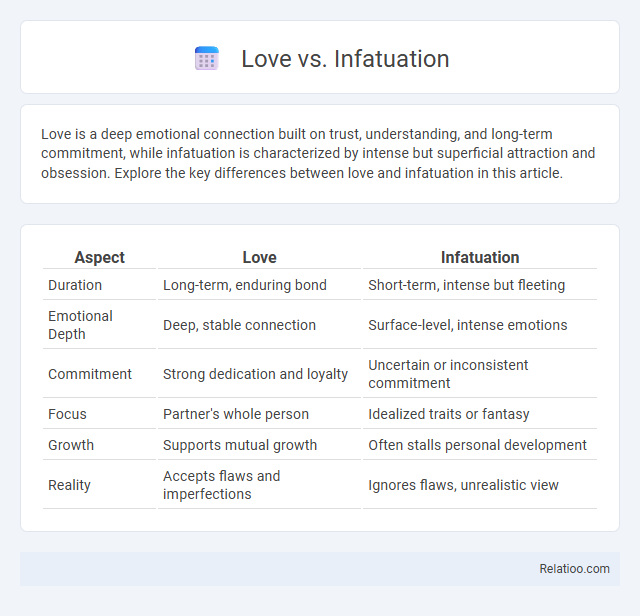Love is a deep emotional connection built on trust, understanding, and long-term commitment, while infatuation is characterized by intense but superficial attraction and obsession. Explore the key differences between love and infatuation in this article.
Table of Comparison
| Aspect | Love | Infatuation |
|---|---|---|
| Duration | Long-term, enduring bond | Short-term, intense but fleeting |
| Emotional Depth | Deep, stable connection | Surface-level, intense emotions |
| Commitment | Strong dedication and loyalty | Uncertain or inconsistent commitment |
| Focus | Partner's whole person | Idealized traits or fantasy |
| Growth | Supports mutual growth | Often stalls personal development |
| Reality | Accepts flaws and imperfections | Ignores flaws, unrealistic view |
Understanding Love and Infatuation
Love entails a deep emotional connection characterized by trust, commitment, and genuine care, fostering long-term relationships built on mutual respect. Infatuation is marked by intense but often superficial attraction, driven primarily by physical appearance or idealized perceptions, typically lacking emotional depth or stability. Understanding the distinction between love and infatuation involves recognizing that love grows through shared experiences and vulnerability, while infatuation often fades as initial excitement diminishes.
Key Differences Between Love and Infatuation
Love involves deep emotional connection, long-term commitment, and understanding, while infatuation is characterized by intense but short-lived attraction and idealization. Your feelings of love grow with time, trust, and shared experiences, whereas infatuation is often driven by physical attraction and fantasies without substantial emotional depth. Recognizing these key differences helps you build meaningful relationships based on genuine affection rather than fleeting excitement.
Psychological Roots of Infatuation
Infatuation stems from intense emotional arousal and idealized perceptions, driven by the brain's release of dopamine and norepinephrine, creating a temporary but overwhelming attraction. Unlike love, which develops over time through deep emotional connection and mutual understanding, infatuation is rooted in psychological factors such as fantasy projection and unmet emotional needs. Recognizing these psychological roots can help you differentiate fleeting infatuation from genuine, lasting love.
The Science Behind Falling in Love
Falling in love triggers complex neurological responses, activating brain regions associated with reward, motivation, and pleasure, such as the ventral tegmental area and caudate nucleus. Infatuation often involves heightened dopamine levels causing intense obsession and euphoria, while deeper love engages oxytocin and vasopressin, fostering bonding and long-term attachment. Understanding these biological mechanisms helps you differentiate fleeting passion from enduring emotional connection.
Emotional Signs of True Love
True love is characterized by enduring emotional connection, deep empathy, and mutual respect, whereas infatuation is marked by intense but fleeting passion and idealization. Emotional signs of true love include consistent support during challenges, genuine care for the partner's well-being, and a balanced sense of trust and vulnerability. Unlike infatuation, true love fosters long-term commitment, emotional stability, and authentic understanding between partners.
Behavioral Patterns of Infatuation
Infatuation often manifests through intense, obsessive thoughts and idealization of the other person, causing erratic emotional highs and lows. You may exhibit impulsive behaviors, such as constantly seeking attention or approval, driven more by fantasy than reality. Unlike love's steady, mature patterns of trust and commitment, infatuation's behavioral patterns are transient and fueled by immediate gratification.
How Love Grows Over Time
Love grows over time through deep emotional connection, trust, and mutual understanding, distinguishing it from infatuation's intense but fleeting passion. Your feelings evolve with shared experiences, patience, and consistent communication, fostering a bond that strengthens beyond initial attraction. Unlike infatuation, true love matures, building resilience and commitment through life's challenges.
Dangers of Mistaking Infatuation for Love
Mistaking infatuation for love can lead to emotional turmoil and poor decision-making, as infatuation often involves intense but short-lived attraction lacking deep understanding or commitment. You may overlook red flags or disregard compatibility issues, increasing the risk of heartbreak and unhealthy relationships. Understanding these differences is crucial to fostering genuine connections and long-term happiness.
Building Healthy, Loving Relationships
Building healthy, loving relationships requires distinguishing love from infatuation by focusing on emotional depth, mutual respect, and long-term commitment. Love involves trust, consistent communication, and empathy, while infatuation is marked by intense but short-lived passion and idealization. Prioritizing emotional intimacy and realistic expectations fosters enduring bonds that support growth and well-being for both partners.
Moving Beyond Infatuation to Lasting Love
Moving beyond infatuation to lasting love requires recognizing the difference between intense, temporary attraction and deep emotional connection rooted in trust and mutual respect. You must nurture open communication, shared values, and emotional intimacy to transform initial passion into enduring commitment. Understanding this progression allows relationships to develop stability and resilience over time.

Infographic: Love vs Infatuation
 relatioo.com
relatioo.com